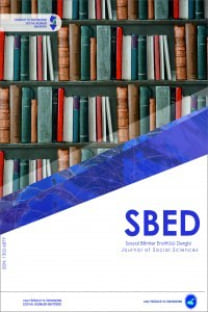TÜKETİCİLERİN HAZIR GİYİM TERCİHLERİNDE MARKA, REKLAM ARACI, TUTUM VE SATINALMA KARAR VERME TARZLARI
Marka, Reklam Aracı, Tutum, Satınalma
READY TO WEAR PREFERENCE OF CONSUMERS BRAND, ADVERTISING TOOL, ATTITUDE AND PURCHASING DECISION MAKING STYLES
Brand, Advertising Tool, Attitude, Purchasing,
___
- Agor, Weston H. (1986). The Logic of Intuition: How Top Executives Make Important Decision. Organizational Dynamics, 14 (3), 5-18. Al-Fawwaz, Bader M., Atallah M. Al-sahtnawi ve Wafa S. Alsharafat (2015). Recognizing The Importance of Brand Awareness on E-Commerce Sales While Shopping on Internet: Empirical Analysis of European Countries. International Journal of Interactive Mobile Technologies, 9 (1), 15-18. Alina, Ghirvu (2013). Factor Responsible for Consumer’s Attitude Towards Advertising. Academic Journal, 22 (1), 1733-1742. Allwood, C. Martin ve Salo, Ilkka (2012). Decision-Making Styles and Stress. Internetional Journal of Stress Management, 19 (1), 34-47. Ateljevic, Jovo ve Frank Martin (2011). The Use of Location Specific Advertisements on Facebook: Can They Help Entrepreneurs Solve Problems Associated with Banner Advertisements?. The Ninth Internetional Conference: Challenges of Europe: Growth and Competitiveness Reserving the Trends, 16,17-32. Bakewll, Cathy ve Vincent-Wayne Mitchell (2006). Male Versus Female Consumer Decision Making Styles. Journal of Business Research, 59, 1297-1300. Bandara, Wanninayake W.M.C. (2014). Consumer Decision-Making Styles and Local Brand Biasness: Exploration in The Czech Republic. Journal of Competitiveness, 6 (1), 3-17. Bao, Yeqing, Kevin Z. Zhou ve Chenting Su (2003). Face Consiousness and Risk Aversion: Do They Affect Consumer Decision-Making?. Psychology & Marketing, 20 (8), 733-755. Bearden, William O. ve Michael J. Etzel (1982). Reference Group Influence on Product and Brand Purchase Decisions. Journal of Consumer Research, 9, 183-194. Busen, Salem M.S. ve Che Su Mustaffa (2014). The Role of Interactive Advertisement in Developing Consumer-Based Brand Equity: A Conceptual Discourse. Procedia-Social and Behavioral Sciences, 155, 98-103. Christodoulides, George ve Leslie D. Chernatony (2010). Consumer Based Brand Equity Conceptualization and Measurement: A Literature Review. International Journal of Market Research, 52 (1), 43-66. Dahlen, Micael ve Jonas Bergendahl (2001). Information and Transforming on the Web: An Empirical Study of Response to Banner Ads for Functional and Expressive Products. International Journal of Advertising, 20, 189-205. Draganska, Michael, Wesley R. Hartmann ve Gena Stanglein (2014). Internet Versus Television Advertising: A Brand-Building Comparison. Journal of Marketing Research, 51 (5), 578-590. Durkin, Mark (2004). In Search of the Internet-Banking Customer Exploring the use of Decision Styles. The International Journal of Bank Marketing, 22 (7), 484-503. Durmuş, İbrahim (2016). TV Reklamlarının Tüketicilerin Tutum ve Motivasyonları Üzerindeki Sosyo-Ekonomik Etkileri: Üniversite Öğrencileri Üzerine Bir Uygulama. Uluslararası Bilimsel Araştırmalar Dergisi, 1 (1), 28-40. Durmuş, İbrahim & Fetullah Battal (2018). Üniversite Öğrencilerinin Hazır Giyim Satınalma Kararlarında Reklamlara Yönelik Tutumları ve Marka Tercihleri. Gümüşhane Üniversitesi Sosyal Bilimler Enstitüsü Elektronik Dergisi, 9 (24), 147-176. Frey, Bruno S., Christine Benesch ve Alois Stutzer (2007). Does Watching TV Make us Happy?. Journal of Economic Psychology, 38 (3), 283-313. Gati Itamar, R. Gadassi ve R. Mashiah-Cohen, (2012). Career Decision-Making Profiles vs. Styles: Convergent and İncremental Validity. Journal of Vocational Behavior, (81), 2-16. Hatchuel, Armand (2001). Towards Desing Theory and Expandable Rationality: The Unfinished Program of Herbert Simon. Journal of Management and Governance, 5 (3-4), 260-273. Henderson, John C. ve Paul C. Nutt (1980). The Influence of Decision Style on Decision Making Behavior. Management Science, 26 (4), 371-385. Hur, Yunyoung (2015). Ideal Frequency Exposure to Web Banner Advertising for Online Shopping Malls. Journal of Marketing Thought, 2 (1), 52-58. Ilhan, Mustafa ve Bayram Çetin (2014). Comparing The Analysis Results of The Structural Equation Models (SEM) Conducted Using LISREL and AMOS. Journal of Measurement and Evaluation in Education and Psychology, 5 (2), 26-42. Jin, Hyun Seung ve Richard J. Lutz (2013). The Typicality and Accessibility of Consumer Attitudes Toward Television Advertising: Implications fort he Measurement of Attitudes Toward Advertising in General. Journal of Advertising, 42 (4), 343-357. Jumisko, S. Hannele, Ville P. Ilvonen ve Kaisa A. Vaananen V.M. (2005). Effect of TV Content in Subjective Assessment of Video Quality on Mobile Devices. Electronic Imaging, 5684, 243-254. Kao, Hsin, Sean P, H. Kao, Shih-Chih Chen ve Kevin K-S. Chiu (2012). Decision Making Models and Knowlege Management Preferences. Australian Journal of Business and Management Research, 2(4),1-11. Kim, Jae-Eun, Stephen Lloyd ve Marie-Cecile Cervellon (2016). Narrative-Transportation Storylines in Luxury Brand Advertising: Motivating Consumer Engagement. Journal of BusinessResearch, 69 (1), 304-313. Kim, Yoo Jung ve Jin Young Han (2014). Why Smartphone Advertising Attracts Customers: A Model of Web Advertising, Flow and Peronalization. Computers in Human Behavior, 33, 256-269. Koçak, Akin, Temi Abimbola ve Alper Ozer (2007). Consumer Brand Equity in A Cross-Cultural Replication: An Evaluation of A Scale. Journal of Marketing Management, 23 (1-2), 157-173. Koshksaray, A. Abedini, Drew Franklin ve Kambiz H. Hanzaee (2015). The Relationship Between E-Lifestyle and Internet Advertising Avoidance. Australasian Marketing Journal, 23, 38-48. Köster, Moritz, M. Rüth, K.C. Hamborg ve Kaı Kaspar (2015). Effects of Personalized Banner Ads on Visual Attention and Recognition Memory. Applied Cognitive Psychology, 29, 181-192. Leng, Chan Yie ve Delane Botelho (2010). How Does National Culture Impact on Consumers Decision-Making Styles? A Cross Culturel Study in Brazil, The United States and Japon. Brazilian Administration Review, 7(3), 260-275. Lysonski, Steven, Srini Durvasula ve Yiorgos Zotos (1996). Consumer Decision-Making Styles: A Multi-Country Investigation. European Journal of Marketing, 30 (12), 10-21. Merdan, Kurtuluş (2017). Evaluation of Automatic Enrolment in The Private Pension System in Terms of Public and Private Sector Employees (Gümüşhane Sample). Social Sciences Studies Jornal, 3(12), 2029-2040.
- ISSN: 1302-6879
- Yayın Aralığı: 4
- Başlangıç: 2000
- Yayıncı: Yüzüncü Yıl Üniversitesi Sosyal Bilimler Enstitüsü Müdürlüğü
KADINLARIN İŞGÜCÜNE KATILIMINI BELİRLEYEN FAKTÖRLERİN PROBIT MODEL İLE TAHMİNİ: VAN İLİ ÖRNEĞİ
Cemalettin LEVENT, Mehmet Akif ARVAS, Meltem İNCE YENİLMEZ
TÜRKİYE’DEKİ SURİYELİLER: SORUNLAR VE ÇÖZÜM ÖNERİLERİ
GÜNÜMÜZDE TEKSTİLİN MEKAN TANIMLAYICI OLARAK KAMUSAL ALANLARDA KULLANIMI
Sevim Tuğba ARABALI KOŞAR, Fehime Yeşim GÜRANİ
1930 İSTANBUL BELEDİYE SEÇİMLERİNDE GAYRİMÜSLİMLER
AYLA KUTLU’NUN YEDİNCİ BAYRAK ROMANINDA ZORUNLU GÖÇ, GÖÇMENLİK VE MÜBADELE
AŞİRETLER ARASI ÇATIŞMA VE YAĞMALAMA KÜLTÜRÜ: RİŞVAN AŞİRETİ ÖRNEĞİ
LİTERATÜRDE MEŞHUR OLAN NİYET HADİSİNİN İSLAM HUKUKU AÇISINDAN EHEMMİYETİ
DUYGUSAL ZEKÂ İLE İŞDOYUMU İLİŞKİSİNİ İNCELEMEYE YÖNELİK BİR ALAN ARAŞTIRMASI
